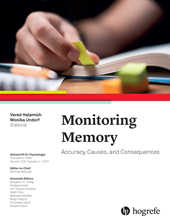On the Role of Generation Rules in Moderating the Beneficial Effects of Errorful Generation
Abstract
Abstract. In participants’ learning of semantically related paired associates, such as whale-mammal, prior research has demonstrated that having participants first attempt to predict what the to-be-learned response to a given cue will be enhances subsequent cued recall of that response, even when such predictions are always wrong (e.g., Kornell et al., 2009). In six experiments, we evaluate the importance of such error-prone predictions having a semantic basis – versus an acoustic (rhyming) basis. Our results show that both semantic generation as well as semantically related materials seem necessary if errorful generation is to have positive effects; generation based on other rules and materials does not aid learning. Learners are not, however, metacognitively aware of such benefits of generating errors.
References
(2007). The generation effect: A metanalytic review. Memory & Cognition, 35(2), 201–210. https://doi.org/10.3758/BF03193441
(1994).
Memory and metamemory considerations in the training of human beings . In J. MetcalfeA. ShimamuraEds., Metacognition: Knowing about knowing (pp. 185–205). MIT Press. https://doi.org/10.7551/mitpress/4561.001.0001(2014). Errorful and errorless learning: The impact of cue–target constraint in learning from errors. Memory & Cognition, 42, 898–911. https://doi.org/10.3758/s13421-014-0408-z
(2006). Impoverished cue support enhances subsequent retention: Support for the elaborative retrieval explanation of the testing effect. Memory & Cognition, 34(2), 268–276. https://doi.org/10.3758/BF03193405
(2015). Mistakes as stepping stones: Effects of errors on episodic memory among younger and older adults. Journal of Experimental Psychology: Learning, Memory, and Cognition, 41(3), 841–850. https://doi.org/10.1037/xlm0000073
(2012). When and why do retrieval attempts enhance subsequent encoding? Memory & Cognition, 40(4), 505–513. https://doi.org/10.3758/s13421-011-0174-0
(2012). Making related errors facilitates learning, but learners do not know it. Memory & Cognition, 40(4), 514–527. https://doi.org/10.3758/s13421-011-0167-z
(1978). On interpreting the effects of repetition: Solving a problem versus remembering a solution. Journal of Verbal Learning and Verbal Behavior, 17(6), 649–667. https://doi.org/10.1016/S0022-5371(78)90393-6
(1978). Depth of processing and interference effects in the learning and remembering of sentences. Journal of Educational Psychology, 70(4), 626–635. https://doi.org/10.1037/0022-0663.70.4.626
(2012). Testing unsuccessfully: A specification of the underlying mechanisms supporting its influence on retention. Journal of Memory and Language, 66(4), 731–746. https://doi.org/10.1016/j.jml.2011.12.008
(2009). Unsuccessful retrieval attempts enhance subsequent learning. Journal of Experimental Psychology: Learning, Memory, and Cognition, 35(4), 989–998. https://doi.org/10.1037/a0015729
(2016). How retrieval attempts affect learning: A review and synthesis. Psychology of Learning and Motivation, 65, 183–215. https://doi.org/10.1016/bs.plm.2016.03.003
(1994). Norms for words that rhyme. Behavior Research Methods, Instruments, & Computers, 26(3), 278–322. https://doi.org/10.3758/BF03204638
(1977). Levels of processing versus transfer appropriate processing. Journal of Verbal Learning and Verbal Behavior, 16(5), 519–533. https://doi.org/10.1016/S0022-5371(77)80016-9
(1998). The University of South Florida word association, rhyme, and word fragment norms http://w3.usf.edu/FreeAssociation/
(1949). The similarity paradox in human learning: A resolution. Psychological Review, 56(3), 132–143. https://doi.org/10.1037/h0057488
(2019). The benefit of generating errors during learning: What is the locus of the effect? Journal of Experimental Psychology: Learning, Memory, and Cognition, 45(6), 1023–1041. https://doi.org/10.1037/xlm0000637
(2014). The benefit of generating errors during learning. Journal of Experimental Psychology: General, 143(2), 644–667. https://doi.org/10.1037/a0033194
(1986). Specific enhancement effects associated with word generation. Journal of Memory and Language, 25(2), 226–237. https://doi.org/10.1016/0749-596X(86)90031-8
(1983). The generation effect when generation fails. Journal of Verbal Learning and Verbal Behavior, 22(2), 153–163. https://doi.org/10.1016/S0022-5371(83)90112-3
(1978). The generation effect: Delineation of a phenomenon. Journal of Experimental Psychology: Human Learning and Memory, 4(6), 592–604. https://doi.org/10.1037/0278-7393.4.6.592
(2015). Judgments of learning as memory modifiers. Journal of Experimental Psychology: Learning, Memory, and Cognition, 41(2), 553–558. https://doi.org/10.1037/a0038388



